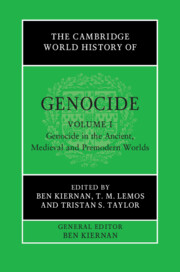Book contents
- The Cambridge World History of Genocide
- The Cambridge World History of Genocide
- The Cambridge World History of Genocide
- Copyright page
- Contents
- Figures
- Maps
- Tables
- Contributors to Volume I
- General Editor’s Acknowledgements
- General Editor’s Introduction to the Series
- Introduction to Volume I
- Part I Themes of Genocide through History
- 1 Genocide before the State?
- 2 The Religion–Genocide Nexus
- 3 Genocide and Gender
- 4 Genocide, Starvation and Famine
- 5 Climate, Violence and Ethnic Conflict in the Ancient World
- Part II The Ancient World
- Part III The Medieval World and Early Imperial Expansions
- Index
2 - The Religion–Genocide Nexus
from Part I - Themes of Genocide through History
Published online by Cambridge University Press: 23 June 2023
- The Cambridge World History of Genocide
- The Cambridge World History of Genocide
- The Cambridge World History of Genocide
- Copyright page
- Contents
- Figures
- Maps
- Tables
- Contributors to Volume I
- General Editor’s Acknowledgements
- General Editor’s Introduction to the Series
- Introduction to Volume I
- Part I Themes of Genocide through History
- 1 Genocide before the State?
- 2 The Religion–Genocide Nexus
- 3 Genocide and Gender
- 4 Genocide, Starvation and Famine
- 5 Climate, Violence and Ethnic Conflict in the Ancient World
- Part II The Ancient World
- Part III The Medieval World and Early Imperial Expansions
- Index
Summary
A question not asked to this point in the study of genocide by all the scholars associated with this work in the various disciplines is whether or not there something inherent in the very social construction we call “religion” that lends itself, adapts itself, all-too-easily to those communities— both nation-states and non-nation-state actors—that perpetrate genocide, either in actuality or in potential? Thus, this contribution begins with something of a theoretical look-see vis-à-vis that nexus between religion and genocide by suggesting applicable definitions for both and further outlining the constituent factors of each. (NB: There are, in truth, uncomfortable similarities between religious groups and genocidal perpetrator groups which, to my understanding, have never been addressed or explored.) To further bolster my overall argument—that religion, however defined and understood, is a “participating factor” (my preferred term) in all genocides, both historically and contemporarily—a series of case studies, using Raphael Lemkin’s tri-partite division from his incomplete History of Genocide—Antiquity, Middle Ages, Modern Times—are examined to determine whether my thesis holds.
- Type
- Chapter
- Information
- The Cambridge World History of Genocide , pp. 86 - 102Publisher: Cambridge University PressPrint publication year: 2023



